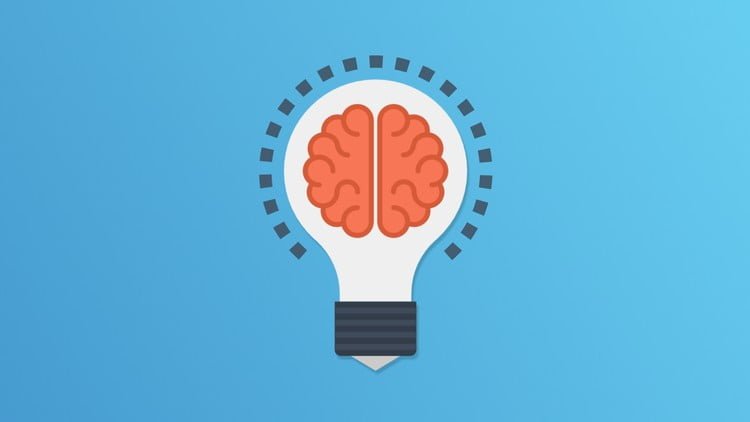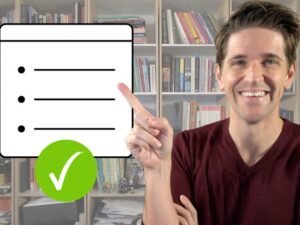- 030 244 2330
- info@preconceptacademy.com
Building Your English Brain
- Description
- Curriculum
- FAQ
- Reviews
If you can’t think in English, you can’t become totally fluent in English. That may sound a little bit strange, but it’s true. Translating your language into English will keep you from being able to naturally communicate. This course will push you to use your English brain. It includes exercises, techniques, and a rigorous path toward fluency. This course is absolutely essential for anyone ready to take their English to the next level.
You will be able to see my face and mouth clearly in each video lesson, and I will use a blackboard at all times.
Each lesson focuses on a single idea, and each is comprehensive. You can go at your own pace and should take your time, with lots of practice between videos. Replaying each lesson is highly recommended.
The old expression ‘practice makes perfect’ is not correct. In fact, it should be: ‘PERFECT practice makes perfect’. That means, you can work hard and make very little progress with your spoken English, or you can work hard and smart, with this course, and make huge strides towards your English speaking goals. That’s what this course is all about—working smart.
-
2TipsVideo lesson
There are some really important things to keep in mind throughout this course, and as you continue to work on your English Brain.
These are:
1. It takes hard work to do anything well.
2. You have to work in the right WAY to improve.
3. You MUST develop the ability to think in English if you want to be fluent.
4. Surround yourself with English and practice constantly.
5. Get feedback from somewhere, and make English part of your lifestyle.
-
3ReadingVideo lesson
Reading is an important part of learning any language, and it doesn't have to be boring. To really develop your ability to think in English, and to really be able to use English to express yourself clearly and express yourself with a wider range of sentence patterns, it's important to have a background in literature. Find something you enjoy reading and stick with it. When you come across strange words, try to use context to figure out the meaning, then if you need, find the definition in an English dictionary.
-
4New WordsVideo lesson
When you are learning new words, it isn't enough to only learn the meaning in your own language. Instead, you have to understand the word in English, deeply, which includes the definition as well as the common uses, where it sounds natural and where it doesn't. So, when you come across a new word, learn all the forms of that word, learn the word in context (whether in a conversation or through reading), use an all-English dictionary to get all possible meanings, and practice using it as much as you can.
-
5IdiomsVideo lesson
Idioms are special phrases that native speakers of a language use to communicate quickly, and these phrases often cannot be understood by the words that make them up. Idioms are tough to learn because of this. The important thing to keep in mind about idioms is that not everyone uses all idioms--they are often local. So, be extra careful when using really local phrases. Make absolutely sure you understand the 'social feeling' before using them yourself.
-
64-Word ExerciseVideo lesson
The 4-word exercise is a really simple and powerful tool for developing the ability to use English in your head. It works like this: Write down four different kinds of words, without thinking of any connections between them--they should be random. Now, try to put these into as many single sentences as you can. It takes quite a lot of creativity and forces you to think in English. To make it more challenging for yourself, add another word, and then another. Remember, you must use all words in only one sentence.
-
7VariationsVideo lesson
One of the greatest exercises you can do to develop the ability to think in English is to make variations. A variation, in this case, is basically a different way of saying (or writing) the same thing. Making variations forces you to be creative with English, which will also enhance your ability to describe things. Start with short sentences and try to write them in as many ways as you can, keeping the basic meaning, but changing structure, words, grammar, etc. The more you do it, the better you will get.
-
8Full VariationsVideo lesson
Once you have mastered simple variations, you can move on to doing full variations. Take a paragraph from a book you are reading or from an article on the internet, and try to rewrite it in your own words. Keep the tone and meaning the same, but see how many different ways you can express the ideas. You will soon find that you are not stuck seeing one English sentence as how it must be, but rather that meaning can take many forms, that paragraphs and sentences are flexible and bendy. Once you start thinking like this you can also begin speaking more clearly, using specific descriptions and saying what you really mean. This is a powerful tool.
-
9ListeningVideo lesson
If you want to improve your listening very quickly, there is one BEST method. It's really boring, but it works. It goes like this: Find a short audio mp3 clip, perhaps a news report, that is very difficult for you to hear. Sit down with a pen and a piece of paper and listen to the clip over and over again. Try to write down, as you listen, every word in the clip. Soon, you will start to pick up some of the easier words, and then you can slowly piece together the rest, like a puzzle. While it may take you weeks to complete only one, your listening will become much sharper. It's really effective.
-
10Thinking ExercisesVideo lesson
If you want to start thinking in English, you have to get used to thinking in English. In fact, the line between thinking words and speaking them is not so clear, so it isn't as tough as you may think to get into the habit. Having English thoughts can be uncomfortable at first, but there are some easy ways to get started. Perhaps the easiest way is to look around you and begin describing things. Once you are used to describing objects in detail (only in your mind), start describing actions and events, and then begin wondering about those events and making connections to other things. Keep a constant stream of English going in your mind. Do this whenever you have a free moment.









